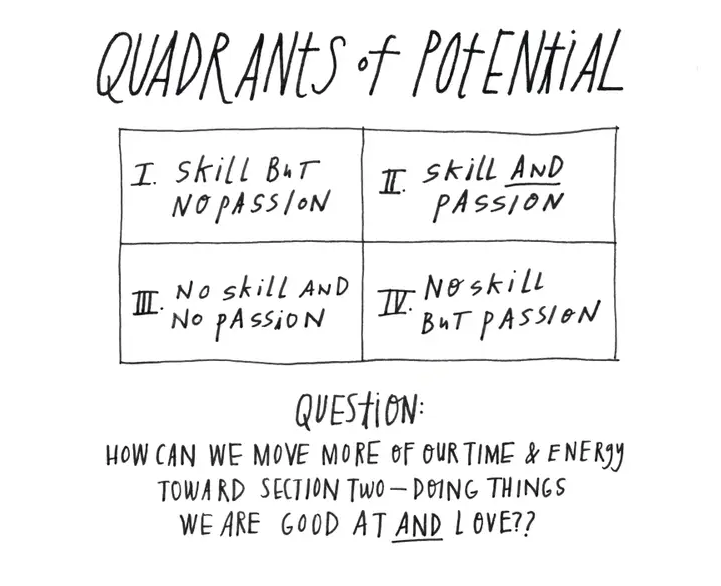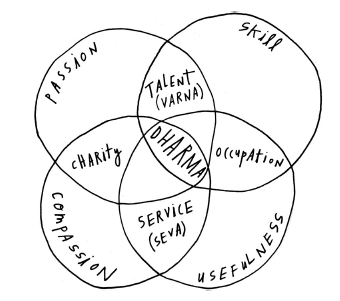Think Like A Monk by Jay Shetty — Book Summary and Notes
Jay Shetty distills the timeless wisdom he learned as a monk into practical steps anyone can follow to live a more meaningful life.
🎯 The Book in 3 Sentences
- Passion + Expertise + Usefulness = Dharma
- Life is more meaningful when we define ourselves by our intentions rather than our achievements.
- The highest purpose is to live in service. If you wait until you have enough time and money to serve, you will never have enough.
Jay Shetty
"Jay Shetty distills the timeless wisdom he learned as a monk into practical steps anyone can follow to live a less anxious, more meaningful life amongst the challenges we all face today."
He'd given up the life the world told us we should all want.

Think Link A Monk
By Jay Shetty
1. Identity
“I am not what I think I am, and I am not what you think I am. I am what I think you think I am.” — Charles Cooley
The Media Mind Game
Our identity is tied up in what we think others think of us. The more we get absorbed in images of success, troubling news, and celebrity gossip, the more our values are tainted with envy, judgment, competition, and discontent.
When we tune out the opinions, expectations, and obligations of the world around us, we begin to hear ourselves. No matter what you think your values are, your actions tell the real story.
Clarifying our identity and living by our values is the first step toward living a happier, healthier, and more meaningful life.

2. Negativity
"The less time you fixate on everyone else, the more time you have focus on yourself." — Jay Shetty
Understanding Negativity
- We have three core emotional needs: Peace, Love, and Understanding
Negativity often springs from a threat from one of three needs
- A fear that bad things are going to happen (loss of peace)
- A fear of not being loved (loss of love)
- A fear of being disrespected (loss of understanding)
Becoming an Objective Observer
When we find ourselves judging others, we should take note. Judging creates an illusion; that if someone is failing, then we must be moving forward.
- In Sanskrit, the word anartha means "things not wanted", and to practice, anarta nivritti is "to remove that which is unwanted."
1. Spot: Become aware of a feeling or issue.
2. Stop: Pause to address what the feeling is and where it comes from.
3. Swap: Amend our behavior in a new way of processing the moment.
Types of Forgiveness
Revenge is the mode of ignorance. Forgiveness is a Two-Way Street.

Aim for Transformation Forgiveness: Find the strength and calmness to forgive without expecting an apology or anything else in return.
3. Fear
"Fear does not prevent death. It prevents life." — Buddha
Fear as its Own Entity
Talking to our fear separates us and helps us understand that the fear is not us; it is just something we're experiencing. "I am angry" becomes "I feel angry".
- The Cause Of Fear: Attachment
- The Cure For Fear: Detachment
Fear motivates us. Sometimes it motivates our survival instincts, but sometimes, if we aren't careful, it limits us to what we think will keep us safe.
A monk's mind practices detachment. When we can separate our personal feelings, we diminish our fear of missing out, and feel more fulfilled to the world around us.
4. Intention
Four Fundamental Motivations
- Fear: Driven by "fear of death."
- Desire: Seeking personal gratification through success, wealth, and pleasure
- Duty: Motivated by gratitude, responsibility, and the desire to do the right thing
- Love: Compelled by care for others and the urge to help them
The Maya of Success
Our path to adventures, pleasures, and comforts often takes the form of material goals. Living intentionally means stepping back from external goals, letting go of outward definitions of success, and looking within.
- Material gratification is external, but happiness is internal.
- Success is earning money, and being respected in your work.
- Happiness is feeling good about yourself, having close relationships, and making the world a better place.
Monks focus on the satisfaction that comes from living a meaningful life. Purpose and meaning lead to true contentment.
Wealth is your desired outcome. Why?
I don't ever want to have to worry about money again.
Why do you worry about money?
I can't afford to take the vacations I dream about.
Why do you want those vacations?
I see everyone else on exotic trips on social media. Why should they get to do that when I can't?
Why do you want what they want?
They're having much more fun than I have on my weekends.
What's missing?
I want my life to be more exciting, more adventurous, more exhilarating.
Notice how different that is from "I want money."
5. Purpose
"My limitation makes space for the gifts of other people" — Jay Shetty
Quadrants of Potential
We often work on things we're good at but don't love (Quadrant I), then we use our spare time to work on things we love but aren't good at (Quadrant IV) because we don't spend enough time developing them.

We often hear two phrases when growing up:
- "You never amount to anything."
- "You can be anything you want to be."
But the truth is that you can't be anything you want to be, but you can be everything you are.
Finding Your Dharma
In Buddhism, Dharma is about finding your universal. It combines your natural inclination, your thrive mode, and your strengths to serve others. Dharma is a passion for the service of others. Your passion becomes your purpose when you use it to help others.
- Passion + Expertise + Usefulness = Dharma

6. Routine
"We are never free of daily chores and routines, but to be enlightened is to embrace them." — Jay Shetty
Time Has Memory
- Location has energy; Time has memory
- If you do something at the same time every day, it becomes easier and natural.
- If you do something in the same space every day, it becomes easier and natural.
The more your personal spaces are devoted to single, explicit purposes, the better they will serve you not only in the fulfillment of your Dharma but also in your mood and productivity.
7. Ego
"What belongs to you today, belonged to someone yesterday and will be someone else's tomorrow."
The real ego is our very essence—the consciousness that makes us aware and awake to reality. The ego is an identity crafted to preserve our sense of being the most significant, the most important, the one who knows everything.
Judgement
- In the act of criticizing others for failing to live up to higher standards, we are failing to live up to higher standards.
- We pass judgment to deflect others' attention or our own from shortcomings we see in ourselves.
- "Projection" is the psychological term for our tendency to project onto others emotions or feelings that we don't wish to deal with ourselves
Look for opportunities to detach from ego and put forth a thoughtful, productive response.
1. Receiving an insult — take a broader perspective and respond to the situation
2. Receiving a compliment — take the opportunity to be grateful for the help you've received.
3. Arguing with a partner — see the other side.
8. Gratitude
"We're in the habit of thinking we don't deserve misfortune, but that we do deserve whatever blessings come our way." — Jay Shetty
When we are caught in the mind of poverty, we focus on what we are lacking; we feel we don't deserve love, and we ignore all that we have been given. The conscious practice of gratitude is the way out of the poverty mentality that erodes our appreciation and, with it, our integrity. Kindness begets kindness.
- Keep a Gratitude Journal
- Practice Gratitude Meditation
9. Relationships
"Every person is a world to explore." — Thick Nhat Hanh
Four Types of Trust
- Competence: The person has the right skills to solve your issue. They're an expert or authorities in their area.
- Care: They care about your well-being and what's best for you, not your success.
- Character: People with a solid moral compass and uncompromising values
- Consistency: Reliable, present, and available when you need them.
Four Stages of Trust
- Neutral Trust: Positive qualities exist that don't merit the trust
- Contractual: "I'll scratch your back if you scratch mine!" (Quid Pro Quo of relationships)
- Mutual: Help goes both ways. You know you'll be there for one another in the future (Patience and commitment).
- Pure: No matter what happens, you'll have one another's backs.
Trust is a Daily Practice
- Making and fulfilling promises (contractual trust)
- Giving those you care about sincere compliments and constructive criticism; going out of your way to offer support (mutual trust)
- Standing by someone even when they are in a bad place, have made a mistake, or need help that requires significant time (pure trust)
10. Service
"We seek to leave a place cleaner than we found it, happier than we found, the world better than we found it." — Jay Shetty
- The highest purpose is to live in service
- You don't have to have to give
- If you wait until you have enough time and money to service, you will never have enough.
Ask Yourself
- "How am I serving people around me—at work, at home, in my community?
- "How can I use my talents to serve others and make a difference?"
In A Nutshell
- Passion + Expertise + Usefulness = Dharma
- Life is more meaningful when we define ourselves by our intentions rather than our achievements.
- The highest purpose is to live in service. If you wait until you have enough time and money to serve, you will never have enough.
